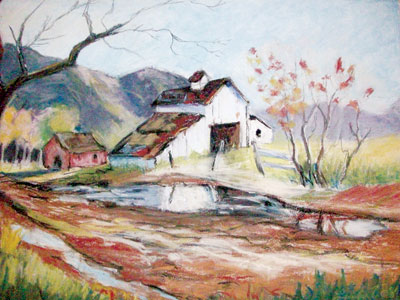All Nonfiction
- Bullying
- Books
- Academic
- Author Interviews
- Celebrity interviews
- College Articles
- College Essays
- Educator of the Year
- Heroes
- Interviews
- Memoir
- Personal Experience
- Sports
- Travel & Culture
All Opinions
- Bullying
- Current Events / Politics
- Discrimination
- Drugs / Alcohol / Smoking
- Entertainment / Celebrities
- Environment
- Love / Relationships
- Movies / Music / TV
- Pop Culture / Trends
- School / College
- Social Issues / Civics
- Spirituality / Religion
- Sports / Hobbies
All Hot Topics
- Bullying
- Community Service
- Environment
- Health
- Letters to the Editor
- Pride & Prejudice
- What Matters
- Back
Summer Guide
- Program Links
- Program Reviews
- Back
College Guide
- College Links
- College Reviews
- College Essays
- College Articles
- Back
Hope and Brotherhood
"You may say that I'm a dreamer, but I'm not the only one. I hope someday you'll join us, and the world will live as one." --John Lennon
Hopes and dreams are visions that everyone looks to achieve in the future. Brotherhood is a special bond between two people that connect them in a unique way. Hope and brotherhood are intertwined; family relationships inspire a more passionate sense of hope. Nobel Peace Prize winner John Steinbeck created the story Of Mice and Men to center on two men taking a journey to achieve their idealistic dream. In the story, George and Lennie are migrant workers longing for their own piece of land and the satisfaction that comes with it. Set in the Great Depression, the land is filled with lonely laborers who are forced to work to survive. George and Lennie take up work on a ranch where their only hope is fueled by their friendship. Through George and Lennie's relationship, Steinbeck proves that hope is strengthened by the anchor of brotherhood.
Lennie's hope shines through his attachment to George. Lennie's belief in their companionship is part of their strong connection: "'Because I got you an'--''An' I got you. We got each other, that's what, that gives a hoot in hell about us,' Lennie yelled triumphantly" (Steinbeck 104). Lennie's enthusiasm and the power forced through his words portrays his devotion to George. Lennie speaks as if he knows exactly what is going to happen in the future and completely trusts George's statements, motives, and dreams. George and Lennie hold on to the futuristic dream of having their own farm: "'An' live off the fatta' the lan'' Lennie shouted.'An' have rabbits. Go on George! Tell about what we're gonna have in the garden and about the rabbits in the cages and about the rain in the winter and the stove and how thick the cream is like you can hardly cut it. Tell about that, George" (14). Lennie is so excited; just the very mention of the dream makes him buzz with happiness. Lennie's constant reaffirmation from George shows that he has to get approval from his brother in order to go on. His hopes are always the comfort zone he returns to, what makes him happy. When George approves of them, Lennie is completely reassured and content.
A bond of friendship similar to George and Lennie's can evoke one's dreams and ambitions. When man is connected to another individual, the companionship sparks the candle of hope. When George and Lennie talk about their dreams, George gets worked up and spills his heart and soul into his speech: "'With us it ain't like that. We got a future. We got somebody to talk to that gives a damn about us. We don't have to sit in no bar room blowin' our jack jus' because we got no place else to go...But not us' " (14). George's force and emphasis displayed through his wording shows that he really believes that one day, his dream will come true. When talking to Lennie, there is a sparkle in George's eyes; Lennie is the hope that fuels George. The circumstances that the characters are placed in place a doubt in their source of hope: "They looked at one another, amazed. This thing they had never really believed in was coming true... [George's] eyes were full of wonder.'I bet we could swing her.' He repeated softly" (60). George knows that as long as Lennie is around, he can keep dreaming, and not feel foolish about it. George simply wants a place to belong, and people with whom to belong. The farm represents the possibility of freedom, self-reliance, and protection from the outside world. Its high status makes the men long for it. George gets the feeling of belonging from Lennie, the bond of their brotherhood is strong enough to fight anything. The repeated discussions of the dream is understandable, since it is a total paradise for men who want to be controlling their own lives.
Hope is strengthened by the fixture of brotherhood, as proved by the relationship of Lennie and George. Steinbeck shows that their idolized dream becomes this untouchable fantasy that keeps them going. Lennie is George's driving force and George is Lennie's guidance, his mentor. Lennie is the representation of George's dreams, hidden with another man. Lennie is the dream; Lennie is the threat to success, and the anchor to it. Lennie makes the whole idea worthwhile. As John Lennon put it, there may not be many dreamers out there, but there are a few. Those few have a purpose, and those with a purpose will never give up. When men with hope have strong bonds, that reason to go on becomes inevitable. Goals make life worth it. And when there's a special friend to share them with, it makes it all the better.

Similar Articles
JOIN THE DISCUSSION
This article has 0 comments.
